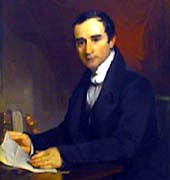John Sergeant (politician)
| John Sergeant | |
|---|---|
 |
|
| Member of the U.S. House of Representatives from Pennsylvania's 1st district |
|
|
In office March 4, 1815 – March 3, 1823 |
|
| Member of the U.S. House of Representatives from Pennsylvania's 2nd district |
|
|
In office March 4, 1827 – March 3, 1829 |
|
| Preceded by | Thomas Kittera |
| Succeeded by | Daniel H. Miller |
|
In office March 4, 1837 – March 3, 1841 |
|
| Member of the Pennsylvania House of Representatives | |
|
In office 1808-1810 |
|
| Personal details | |
| Born |
December 5, 1779 Philadelphia, Pennsylvania |
| Died |
November 23, 1852 (aged 72) Philadelphia, Pennsylvania |
| Political party |
Federalist National Republican Whig |
| Spouse(s) | Margaretta Watmough |
| Alma mater | Princeton University |
| Profession | Law |
John Sergeant (December 5, 1779 – November 23, 1852) was an American politician who represented Pennsylvania in the House of Representatives. He was born in Philadelphia to Jonathan Dickinson Sergeant and Margaret Spencer. He came from a family of American politicians, including his father, his grandsons, John Sergeant Wise and Richard Alsop Wise, and his great-grandson, John Crain Kunkel.
Sergeant was the nominee of the National Republican Party for Vice President of the United States in 1832 on a ticket with Senator Henry Clay, which was defeated.
Sergeant was educated in the common schools and at the University of Pennsylvania at Philadelphia. He graduated from Princeton College in 1795. He became a lawyer and, after being admitted to the bar in 1799, practiced law for fifty years.
In 1800 Sergeant became deputy attorney general for Philadelphia and then commissioner of bankruptcy for Pennsylvania the following year. He was a member of the Pennsylvania State House of Representatives from 1808 to 1810. He was elected as a Federalist to the United States House of Representatives to fill the vacancy caused by the death of Jonathan Williams. He was re-elected three times, serving from October 10, 1815 to March 3, 1823, and managed to reach the position of chairman of the United States House Committee on the Judiciary. Sergeant was a strong backer of Henry Clay's American System and the Second Bank of the United States in Congress, and even traveled to Europe to negotiate loans to the Bank. He was also a strong opponent of slavery who voted against the Missouri Compromise. He then retired (albeit temporarily) from Congress.
...
Wikipedia
